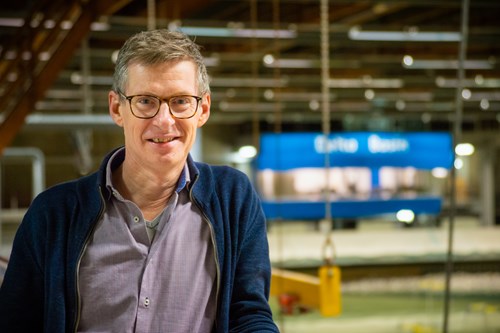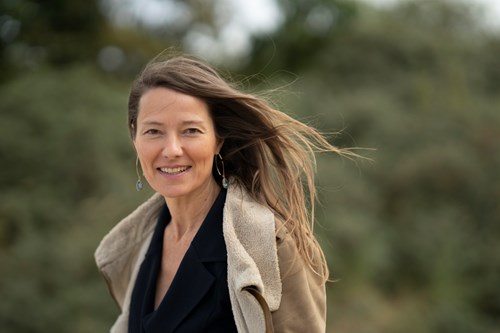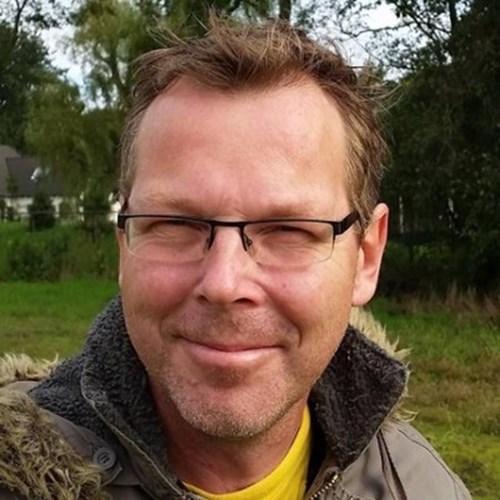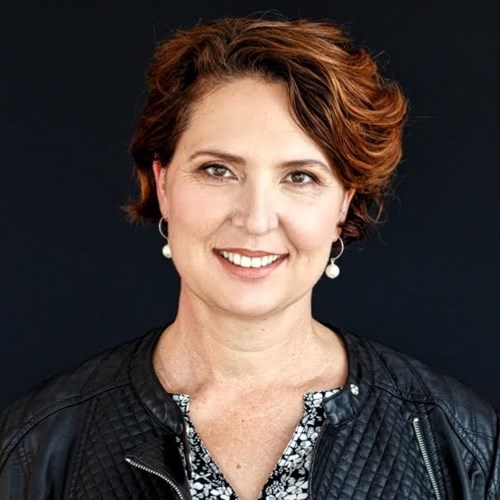Climate work conference: grey? Or show your colours?
CO2, insurability and smart solutions. These were the topics that were discussed at the 2021 Climate Work Conference. In this longread a report of an inspiring day.
The word is up to the climate: every degree counts!

"There's really something going on. In every region of the world, the hot summer days are now more clearly warmer than at the beginning of the 20th century. And it goes on and on: every degree counts," warned Bart van den Hurk (Deltares), one of the lead authors of the recently published IPCC climate report. Van den Hurk kicked off the sixth Climate Work Conference of the Climate Committee.
Life changing experience
He has experienced writing the IPCC report as a life-changing experience. Once every six-seven years, everything that the science on climate has published is analyzed worldwide. "That thoroughness is great, but it has to be, if you want to tell the whole world what is going on. And there is really something going on: the climate is changing, in a way that has never happened before," says Van den Hurk.
Read bart's full story ...
Bart van den Hurk (Deltares): "If we stop reducing CO2 emissions now, sea levels will continue to rise for centuries to come"
5th Climate Work Conference: Grey? Or show your colours?
Do you step out of gray or do you stay in it to exert influence (through engagement)? It is an important and frequently asked question after the publication of the IPCC report. And now also a question that Femke de Vries asked aloud to the five sector organisations during the fifth Climate Work Conference of the Climate Agreement.
Bart van den Hurk, one of the lead authors of the ICCP report, gave a shot across the bow: "We should not wait for governments. The change has to come from the bottom up," he added. A decision to say goodbye to 'grey' contributes to that change. In the run-up to the panel discussion, he gave attendees an insider's look at the IPCC report as a co-author. Van den Hurk thinks it is wonderful to see that a network is being forged from the corridors in Glasgow: "A group of companies that is large enough to be something more than a forerunner. It's a powerful signal from the business sector, but don't forget the consumers who are demanding change."
Insurers opt for engagement for the time being
Back to De Vries' question. Richard Weurding, managing director of the Dutch Association of Insurers, replied that this issue is on the table. Because what do you really do with grey shares? "When I look through the eye hairs, most insurers still opt for engagement for the time being." He was keen to stress that public-private partnerships are the way forward to keeping climate change manageable, but at the same time pointed out that clarity is one of the most important conditions for being effective. "Not only in the short term, but especially in the medium term. The government must take much more control. It is constantly being called, but it is not yet getting off the ground sufficiently."
From the risk side, Weurding sees a similar movement: "Flooding is only partly covered by insurers. We need to look at that now and do much more than we do from a public-private partnership perspective, also together with international reinsurers."
Government must choose
Eelco Dubbeling, director of the Dutch Banking Association (NVB), added that it would help enormously if there was clarity about transition paths. "If the government says: from that date we will move away from fossil, then you have a clear path. If the government does not make that choice, then we must do it, as a company or as a sector and together. I think we as umbrella organisations have a role to play in this."
Data matters
Iris van de Looij, managing director of DUFAS, responded by indicating that every company has its own style and plans. But what is really important is available data to be able to realize those plans. "Do we create these standards as a sector ourselves or do we create standards based on science and link a transaction objective to them? We can decide a lot ourselves, but we do need support." Dubbeling: "And if that takes too long; then we will discuss this ourselves with the government and the companies in which we invest."
Are we doing enough?
De Vries then asked the following question: are we as a sector doing enough? "Reporting is one thing. Taking concrete action is two," says Edith Maat, director of the Pension Federation. "But even then, the question remains whether we are ambitious enough? The objective of the Climate Commitment is very clear, but how do you translate that into practice? And is it enough? What we do, we will have to constantly adjust. And we have to keep learning forever whether they are the right strategies. It's not about what's right or wrong, but whether we're making enough progress."
As a sector, we need to look for the pain
Dubbeling, in turn, believed that progress is being made, but at the same time we must also be strict with ourselves. "I'm glad there was talk of coal at Glasgow, but it's not moving fast enough. So we have to speed up and look for the pain." Enno Wiertsema, director of Adfiz, agrees: "It is not enough to be satisfied with one's own efforts if the whole is not enough. So find your own boundaries and work hard, with each other. This also includes looking for and, if necessary, educating the customer." According to him, the trick is to "show the customer that climate action on two sides delivers something: for the climate, but also financially."
The disaster in Limburg has made it clear that advisors play an important role in raising awareness, according to Weurding. "We learned from this that entrepreneurs close to the Geul had taken out a policy, but not always for the flood risk they ran. In those cases, apparently, a different choice was made, and that is a pity. Especially considering the suffering that the flood has caused and continues to cause."
Make engagement results transparent
According to Van de Looij, the challenge also lies in showing better what the effect of engagement is. "Also with regard to the products that come from fossil fuels, because that is what is lacking at the moment. Share the success stories to learn from!". Maat added that "in the long term, of course, everyone has to get out of fossil. This means that we have to solve a huge transition issue together. Because how do you get there in a good way? How do you get energy produced sustainably? We have to solve that from everyone's responsibility, and we also do that from the Climate Commitment."
Dubbeling: "I miss leadership in the input from politics. The AFM looks at the duty of care, for example when making your home more sustainable. But if you look at what needs to be done to make your home more sustainable, it is a complicated task. This should be more convenient, efficient and easier, for example via an all-in-1 package."
Promises for next year
Eelco Dubbeling: "We have lost nature. We need to go back to that nature and make sure that we actively help nature, especially by making it possible. By setting milestones together, meeting them and knocking on the door of the government for clear transition paths and frameworks within which we can operate and especially by taking action."
Edith Maat: "New themes will be added, such as biodiversity, circular economy and climate adaptation. We need to tackle these themes sector-wide and share knowledge with each other. Having a good discussion with each other and taking on our role."
Enno Wiertsema: "Awareness and climate action: we are now developing a work programme for the consultants, of which large parts will be ready in a year's time. This is about the UN's Sustainable Development Goals, so a little further than just climate, but Sustainable Development Goal or Sustainable Development Goal number 13 will certainly have a place in that. Goal 13 is Climate Action. The program helps advisors to give their clients sustainable advice where it is desired and possible, for now and for the future."
Iris van de Looij: "The power of a dome is to do together what you cannot do alone. So together we ensure more harmonization of the measurement techniques and the adjustment of relevant data in order to make the right choices. From a platform we can learn from each other and then implement standards."
Richard Weurding: "It is a top priority to realise public-private partnerships on tackling climate change, a second proposal is to share the experiences with engagement with each other. For this we could build an infrastructure within the financial sector, so that we can easily find each other and make more impact from shared experience. In doing so, Weurding points to the experiences within the ICSR covenant for the insurance sector. A final priority is to address flood risk through more public-private partnerships."
Financial brainpower required!

"How can we make innovative financing possible? I invite everyone who understands it to think along and contribute to making solutions that really make a difference possible." Liselotte de Koning, director of the Red Cross Princess Margriet Fund, made a pressing appeal during her presentation at the sixth Climate Work Conference: "We are looking for brainpower!"
Mangroves
The King introduced her audience to numerous innovative examples to prevent climate damage to people and the environment. Such as the construction of mangroves off the coast that act as breakwaters. Or storm-proof schools that can also serve as an evacuation center. Or many small dams, so that heavy rain in a valley does not lead to flooding downstream. And that all this is desperately needed is evident from the fact that in the past ten years 83 percent of all natural disasters are related to extreme weather and climate. 1.7 billion people have been affected by these climate- and weather-related disasters. "We can no longer meet all emergency aid. It is also no longer affordable. That is why the emphasis is increasingly on prevention," she emphasized earlier in a longread.
The Red Cross is known for the emergency aid, which is always provided by the mission 'preventing and alleviating human suffering'. With representatives and fourteen million volunteers in almost all countries (192), the Red Cross is in the capillaries of a country. "As a result, we see the impact of climate-related disasters on a daily basis and that will only increase," says De Koning. "Hurricanes are getting heavier, precipitation is getting more intense, and dry is getting even drier."
Increasing emphasis on preventing climate damage
She calls it "so very important" to do much more about prevention. "We can do more in the preparation, on the basis of concrete programs. This not only increases resilience, but we also save money: every euro invested in prevention saves an average of seven euros in emergency aid and reconstruction." According to De Koning, everything is related to the landscape in which people live. A good ecosystem forms a natural buffer. That is why the Red Cross invests in cooperation with nature organizations. "To use their knowledge, so that we can prepare society well on the basis of innovative solutions and look at the long term." The King emphasized the humanitarian impact that the changing climate has. "We would like to think about (the financing of) solutions together with people from the financial sector. For example, about the development of the Mangrove Insurance Facility, a parametric insurance that works with Catastrophe Bonds. For more information, visit rodekruis.nl/rampenpreventie.
Liselotte de Koning (Red Cross PMF): "We would like to think about (the financing of) solutions together with people from the financial sector"
Ad Vlems (initiator ecovillage Boekel): "The construction sector is responsible for 35 percent of CO2 emissions worldwide"
Ecovillages help fight climate change

Smart and sustainable solutions to combat climate change. Ad Vlems, initiator of the ecovillage Boekel, has plenty. And he performs them. How he does that, he showed during a subsession of the sixth Climate Work Conference of the Climate Committee. Achmea is an important partner of the ecovillage.
Ad Vlems has been the first real Climate Mayor of the Netherlands since August. An honourable appointment of the Ministry of Economic Affairs and Climate. The main reason for the appointment is the ecovillage in Boekel developed and realized by Vlems. Twelve years ago he put it on paper and now it is reality: a largely self-sufficient community in climate-proof and even climate-positive houses. "Of great importance," he emphasized, "because the construction sector is responsible for no less than 35 percent of CO2 emissions worldwide."
Curious about the ins and outs of our country's first ecovillage? Read on ...
Living Lab against subsidence
During the subsession, project leader Edwin Lokkerbol of the Living Lab Soil & Technology of the municipality of Gouda discussed a large and costly risk for home and building owners: subsidence due to drought. He also showed what the municipality of Gouda, one of the lowest-lying municipalities in the Netherlands, is doing about this.
"Subsidence is not just a technical issue," he emphasized. "Because how are you going to build in a soil that is sinking further and further? And how do you do that as sustainably as possible? Campus Gouda literally uses our own living environment as a living lab to let students learn and work. How can we tackle subsidence together and create a beautiful, liveable world for the next generation? Very exciting, because we are going to do this innovatively, sustainably and circularly. Educational institutions of different levels can reinforce each other in this."
Edwin Lokkerbol (municipality of Gouda): "Subsidence is not only a technical issue"
"Involve the insurer at the beginning, not at the end"

Insurers are too often at the end of a decision-making process. "And you need that insurer at the very beginning, especially when coming up with innovative solutions to reverse climate change," emphasized Vanessa Otto-Mentz of Deloitte during a subsession of the Climate Work Conference of the Climate Commitment.
Otto-Mentz, partner sustainable solutions at Deloitte, continued to address this important point at the presentation of Edwin Lokkerbol of the Living lab Soil & Technology and Ad Vlems of Ecodorp Boekel. "The sector can make a difference by innovating together, learning together and thus contributing to an insurable world. Therefore, reward good behavior. Make the conditions of the insurance clear. And make sure that you are involved and talk from the start, such as Achmea, so that you get a better feeling about what motivates the people in the eco-homes in Boekel. Then you also know which risks there are or are not."
Net-zero transition: how?
As Otto-Mettz emphasized in her contribution, the insurance sector, like the rest of the financial sector, plays a crucial role in enabling the net-zero transition. But how can the sector help (and incentivise) policyholders to decarbonise their assets and activities? What innovation is needed in the underwriting process to enable net zero business models, technologies and lifestyles? And how can the broader insurance value chain contribute to a faster transition? The answer to these questions and more can be found in the report Climate product innovation within the insurance sector that Deloitte has produced together with ClimateWise (an initiative of the University of Cambridge Institute for Sustainability Leadership) and Icebreaker One .
Prevention makes the difference
Otto-Mentz also reflected on another important point. "If you focus (more) on prevention, you can make the difference in the relationship of trust with the customer. Normally, you only have to deal with that customer if there is damage. You can change that with more prevention."
Ad Vlems completely agrees with her: "You can spend your money now on a smart solution in order to save money in the future." Lokkerbol also sees that advantage, but according to him, a mind shift is needed. As an example, he mentions the public and private partnerships that are necessary to better manage groundwater in the Netherlands. "Now our country is set up in such a way that the water quickly flows away to the sea. That has to change, also with regard to the sewerage system. We have to make sure that we keep the water with us."
Not competing on climate
Otto-Mentz concluded the Climate Work Conference with an appeal: "How can you look broadly at cities and how can you contribute to them now and not only afterwards in the event of damage? What do we insure now and what do we want to insure in the future?"
She reminded the audience that what is insurable now does not have to be in the future. And pointed to the discussion around diesel and electric cars. "So we have to look much bigger, with each other and especially not want to compete too much on climate change. Climate change does not wait. So: Speed up!"
Vanessa Otto-Mentz (Deloitte): "Insurers are too often at the end of decision-making. You need them at the beginning!"
Was this article useful?
